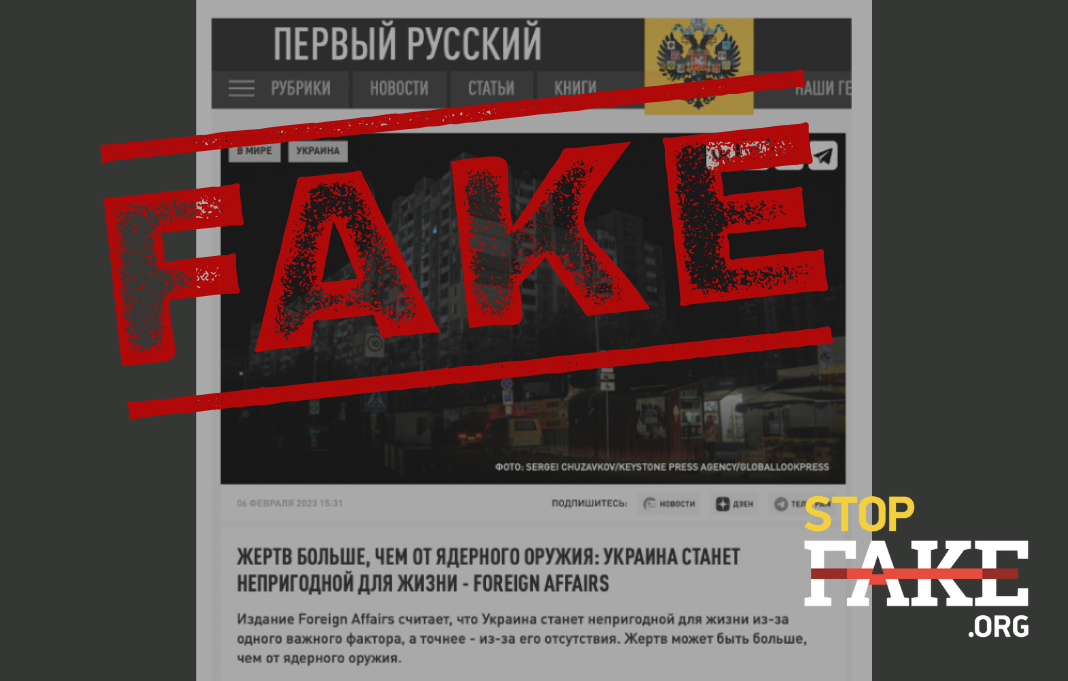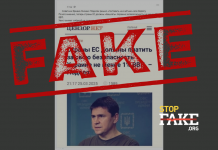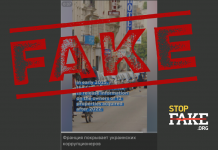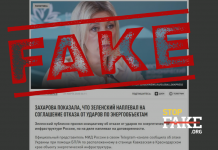A recent Foreign Affairs article talks about steps to be taken to help Ukrainian energy networks avoid collapse in the face of relentless Russian bombardment. The author argues that this is no less important than the supply of modern weapons. The possibility of Ukraine becoming uninhabitable is discussed only in the event of a complete lack of support from the West, and the total Russian destruction of Ukraine’s energy infrastructure.
Pro Kremlin media are predicting that Ukraine will soon become “uninhabitable”, citing a recent article in the American political analysis journal Foreign Affairs. The ultra-right Russian monarchist site Tsargrad declares that due to the lack of electricity in the country, “there may be more victims than from nuclear weapons.”
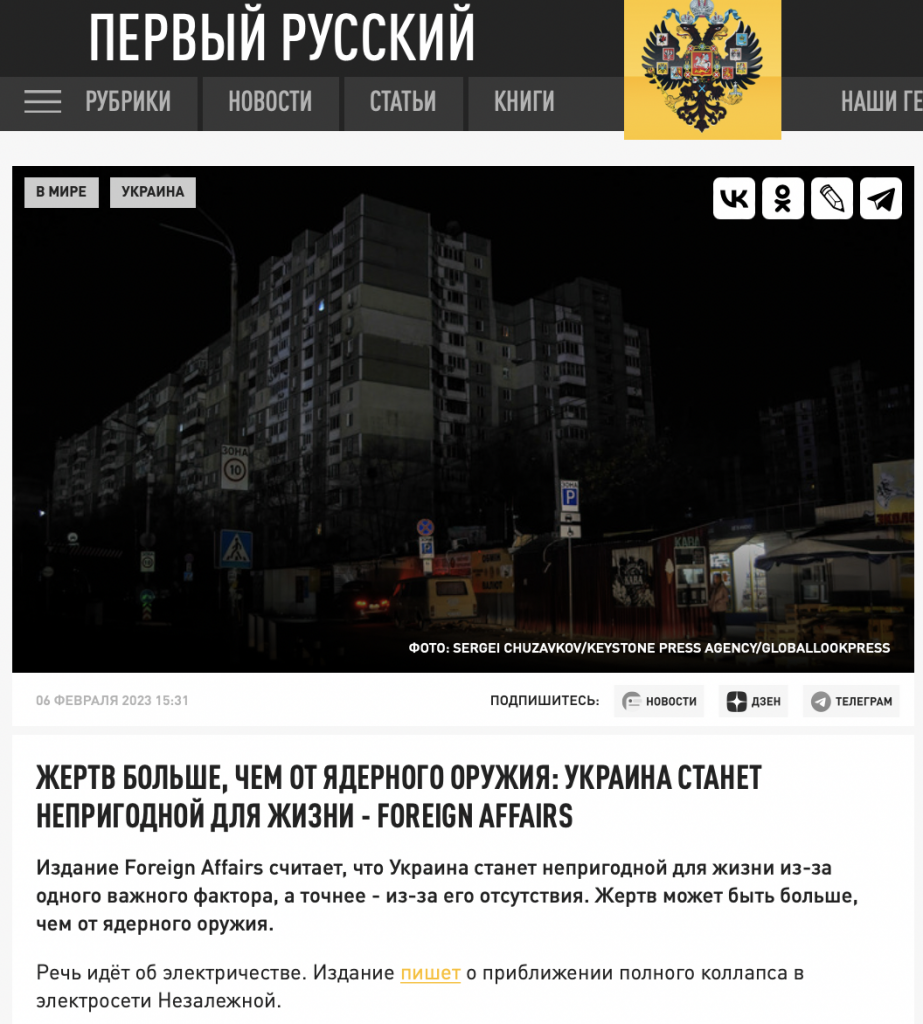
“The publication (Foreign Affairs – ed.) writes about the approach of a complete collapse in the Nezalezhnaya power grid,” Tsargrad writes. The article also explains that Russia began to strike at energy facilities after the “terrorist attack on the Crimean bridge.” Tsargrad uses the term Nezalezhnaya to refer to Ukraine. Nezalezhna in Ukrainian means independent, Russian media often disparagingly refer to Ukraine as Nezalezhnaya, implying that Ukrainian independence is not real and tenuous.
In a style familiar to the Russian media, a real article from a foreign publication was taken to create a fake, distorting and manipulating the article’s focus and meaning, in order to promote another Kremlin propaganda narrative. Foreign Affairs did indeed publish an article Ukraine’s Coming Electricity Crisis. How to Protect the Grid from Russian Attacks which is discusses the fallout from a possible collapse of Ukraine’s energy grid, if effective measures are not taken to protect it.
The author of the article, Thomas Popik, chairman and president of the Foundation for Resilient Societies, lists what can happen to the Ukrainian energy system if catastrophe is not averted, and warns that “Deaths from a grid collapse could be far greater than the casualties caused by a Russian use of tactical nuclear weapons.”
At the same time, Popik writes that “the West has everything it needs to prevent this catastrophe.”
“Kyiv’s friends in NATO and elsewhere should deliver swift and targeted aid for the country’s electric grid, help that is commensurate with the financial resources and diplomatic attention devoted to weapons systems. After all, electric power, not just weapons, sustains Ukraine’s war effort. If Western democracies take effective action and reinforce the country’s tottering electric grid, they will show how societies can be protected from such attacks on critical infrastructure. But if these democracies do not rise to this challenge, bad actors worldwide will gain confidence that striking the electrical underbelly of a country is the best way to bring it to its knees.” – Popik writes.
Thomas Popik warns that if “the country’s [Ukraine’s] electrical grid fails, the billions of dollars spent on advanced weapons systems could be wasted” and lists the kind of support the West should provide in this direction in order to avoid such a failure.
“In Ukraine, epidemics caused by dirty water, starvation, mass migration, reactor meltdowns, dam failures, and even military defeat have become real possibilities. But policymakers should remember that Ukraine’s electricity situation is also an opportunity to practice creative solutions, such as the remanufacturing of large transformers,” Popik writes.
“Ukraine’s electric grid can be reinforced, but time is running short. NATO’s leaders need to give their full attention to this looming crisis if they—and the Ukrainians—do not want to be left in the dark,” he concludes.
Thus, the Foreign Policy article forecasts a catastrophe as a worst-case scenario, which will become possible only in the event of a complete lack of support from the West, and in the further event of continued successful Russian military attacks on Ukraine’s energy infrastructure. The author focuses on how to avoid such a catastrophe.
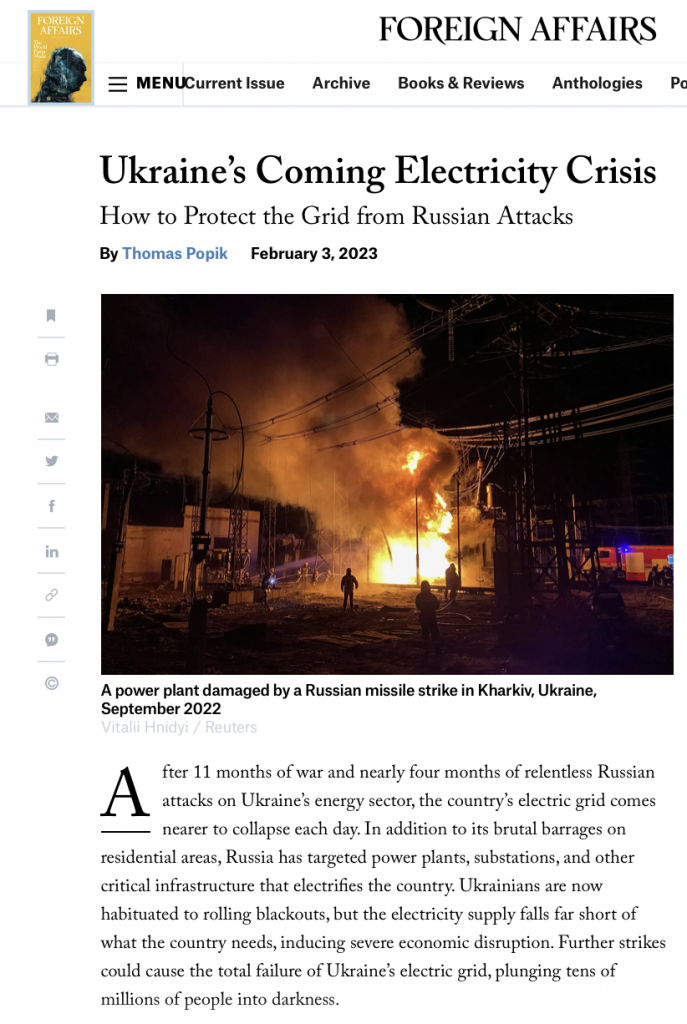
During the Ukraine-EU summit on February 3, Ukraine’s Energy Minister Herman Halushchenko said that more than 5,000 units of energy equipment had been delivered to the country from European Union partners. Also, within the framework of the Ukraine Energy Support Fund, created at the initiative of the European Commission, needed equipment has been purchased for more than 110 million euros. On February 5, an Energy Department delegation discussed continued US support for Ukraine’s energy sector with Laura Lochman, Deputy Assistant Secretary of State for Energy Diplomacy.
Earlier, StopFake debunked a Russian fake claiming that electricity tariffs for all residents of Ukraine would allegedly increase by 47%, and that electricity intended for Ukrainian schools and kindergartens was allegedly rerouted to elite resorts.


